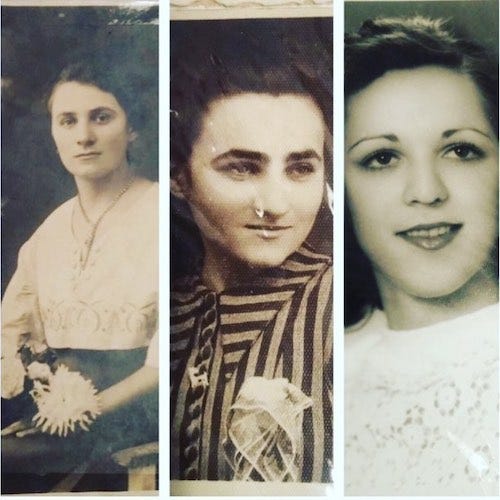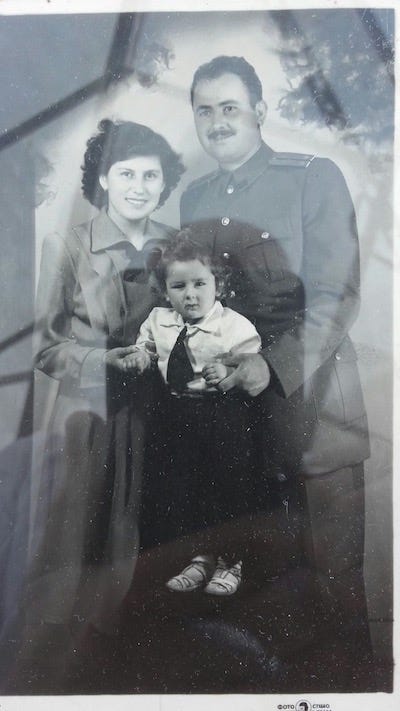Parents - the (Not-So) Invisible Force
"The one thing parents can do for their children is live their lives as fully as they can, for this will open the children’s imagination, grant permission to them to have their own journey, and open the doors of possibility for them. Wherever we are stuck, they will have a tendency to be stuck also or will spend their life trying to overcompensate. Living our own journey as fully as possible is not only a gift to our soul, it also frees up the generation behind us to live theirs as well. The very freedom to live our lives that we wished from our parents, we thereby grant to our children to live theirs." ~ James Hollis
They have been married for over forty years. Soon after they got married, they got pregnant and became parents. They had their first child, and maybe that was their only one, or maybe they had a few more later on. Regardless - their marriage was never the same afterwards. At first, they were busy just being parents. And living their life one day at a time. Then, maybe they became parents again. Soon, passion disappeared, maybe there was some love left, but eventually there was only a habit. They forgot why they loved each other in the first place. She forgot about her dreams of living in a foreign country, and he dropped all the hopes for a more inspiring job. There were a lot of arguments, a lot of tears, harsh words, maybe passive aggression and cold shoulder on her end, maybe silence and depression and avoidance for him. Or maybe, he was the one yelling and blaming her, while she was quiet and submissive. Maybe they were both quiet, distant and in their own isolated and lonely worlds. As their kids were getting older, they recognized the patterns. Even as young children, and as teenagers, they already knew that their parents were not happy, maybe they even felt the absence of love. Very early they felt that the situation in the house isn’t authentic, that people don’t share from the heart, that issues have been buried under the carpet, and that the love is just not there. If parents were a bit more conscious of their children, they tried to show them that despite of everything, they love them. Still, it didn’t matter to the children, as all they could witness was a mere co-existence between two people, just tolerating each other. Often, kids would hear the parents argue, a few times even openly sharing with them that the only reason they are staying together is for them. A mother, often irritable and dissatisfied, cold and almost disgusted with her husband, talking and looking down at him. And, a husband, quiet, emotionally withdrawn, with a love for his wife but a desperate lack of courage to do something about it, voice things unsaid, and risk loosing her (even though he haven’t really “had” her in a very long time). After some time, maybe someone even fell in love with another person. Maybe there were affairs, and secrets, more lies. Maybe they built separate lives, completely new ones, while still maintaining the old ones, somehow managing to show up for the family and the children. Maybe there was no affair, but, once the kids were older and gone, one of them moved out and decided to live on their own. One of them may have stayed in their family home, waiting and hoping that the other one will come back eventually. And maybe they did - maybe they returned after some time. Maybe they even continue living together, but in the same way how they have done in the recent past - sleeping in separate bedrooms, co-existing, with very little communication, but, “together”, though very much apart. After a few years, maybe they separate again. Maybe the same person leaves again, or the other one, this time. This time, however, they’re older. Maybe one of them takes their own space, to find themselves - maybe she even sees a therapist, meditates and does yoga, maybe she even opens up her life and has new friends, and she taps into a whole new layer of herself, her soul-search. Whereas, he, probably remains in their old house, with his old habits, depressed, desperate, with his old patterns and without an initiative to change anything, to get to know himself, just surviving from one day to another… Or maybe, none of this happened and they have been the most amazing and accomplished individuals, with a rich life as a couple since the day they came together, and with it, they served as a great example for their children… maybe, who knows… (I doubt it, though).
Maybe you relate with this scenario...
Maybe it’s a very personal one for you, or your friend, maybe a family member…
Maybe this was the story of your parents, or it is your story…
Or it just may be a totally new storyline for you …
Whatever the case is - I am certain that there is a part of you that resonates with it, or at least some aspects of it. I know, I very much do.
When it comes to my parents, their lives, and their choices - I am still very attached to it. I find them almost too personal. And I often wonder (these days especially) why is it so hard for me to let it go and let them just be - independent and adults, as they are.
How come I take it so personally when my mother gets stuck in a blaming mode? Or when my father just rejects any of my ideas and suggestions about therapy, self-inquiry and change?
How come I take it personally when my mother choses to stay in her small world where she perceives herself as a victim of the universe, or when my father decides not to take a deep look inside of the dark places of himself?
How come I often wonder if they lived their lives fully and if they embraced their own existence and being; if they fulfilled and lived their whole potential and they will feel grateful and rich in experiences, when their last days come?
"Jung once observed that we cannot grow up until we can see our parents as other adults, special to our biography certainly, wounded perhaps, but most of all simply other people who did or did not take on the largeness of their own journey. We have our own journey, for sure, and that is large enough to take us beyond our personal history toward our full potential." - James Hollis
I haven’t been living close to my parents for seventeen years. We see each other sometimes once a year, and other times not for over two years. A lot happens with and within us during that time. We change. We evolve. We get older. But we don’t witness those changes gradually in each other since we don’t see each other regularly. So, when we finally do get to meet - it is all very scary, and strange, and it makes me stop and think about time and impermanence a lot. How things are fine one day, and then someone gets sick and dies the other day. Or how my parents age in the ways that I might not fully understand, approve of, or accept. It certainly makes me be more humble about our mortality and also more grateful for the health that we (so far, at least) still have. I am also very appreciative of the fact that my parents are still friends - if not anything more - and that they have each other in moments of health emergency, for example. I consider myself very fortunate when it comes to this. And, still, I find it often extremely difficult to witness my own parents getting older, changing (or even worse, staying the same), and not being able - or even more so, not having the right - to do anything about it.
As James Hollis so profoundly puts it in his book What Matters Most: Living a More Considered Life: “It has become clear to me that aging itself does not bring wisdom. It often brings regression to childishness, dependency, and bitterness over lost opportunities. Only those who are still intellectually, emotionally, spiritually growing inherit the richness of aging.”
For me personally, the most difficult change to witness is a depression in the old age. But, I wonder - is it what we sometimes see in one (or both) of our parents necessarily a depression or lack of meaning in the second half of life? The word “depression” means literally, to de-press, to press down. What is it that is pressed down? Life’s energy is what is denied, pressed down, violated in a way… This particular type of depression is called an “intrapsychic depression” and it is defined as “the by-product of the refusal to get onboard with one’s life” (James Hollis, Finding Meaning in the Second Half of Life: How to Finally, Really Grow Up). It’s a kind of spiritual death, a sedative that keeps us “in the sleep of childhood".
“Death is only one way of dying; living partially, living fearfully, is our more common, daily collusion with death.” ~ James Hollis
Retirement, for example, as a life milestone which both of my parents are approaching now - is in a way a simplification of life, it gives a certain spaciousness for our gifts and things we never got to do and we always wanted to. It has a potential to bring a new way of living for a person, a self-discovery, even. But what if aging brings bitterness and grief instead? What if all we are capable of doing in the old age is our old regressive habits that don’t take us anywhere and don’t bring us any joy? And what if, we witness one of our parents being in that space - do we do something about it, do we say anything, is it our duty and responsibility to do so? Or do we let them live their own lives and we live ours? And, if so, if we are indeed living our own personal journey - are we really living our own independent lives or are we living (and compensating for) the psychological patterns that we inherited from our parents.
How do we personally deal with our aging parents and their choices? Even more so, how do our parents’ life choices affect us, and our choices, on a deep unconscious level? Do we end up choosing safe, familiar and shielded options, as oppose to new, unknown and uncertain ones? In Jungian psychology it is said that our task, in the process of individuation, is to ask what the psyche wants, and not what the parent (or culture, for that matter) wants. Our choices to either be in service to sleep and security, and not to the task of life and development - these choices create our patterns and values in life. We might not be aware of them as many of them are unconscious, so how would we know then if they are from the depth of our soul or from our repetitive psychological heritage?
“Occasionally someone rises from evening meal,
Goes outside, and goes, and goes, and goes …
Because somewhere in the East a sanctuary stands.
And his children lament as though he had died.
And another, who dies within his house,
Remains there, remains amid dishes and glasses,
So that his children must enter the world
In search of that sanctuary, which he forgot.”
~ Rainer Maria Rilke
I can relate to this so much, it’s painful. How is it that what our parents haven’t done in the adventures of their own journeys, we will need to do - either limited by their regretful example or overburdened by the fact that we need to do it for them… How much of what I have done in surpassing the limits of my education and curiosity, in finding the ways to get to know myself better, in traveling to faraway lands was a compensation for my parents’ unexplored and unexamined lives? How much of my life has been truly mine, and not an agenda that came from my parents. Have I been doing everything I can just to “not be ordinary” as if there is something deeply wrong in being ordinary? During my adult life I spent so much time working with others, supporting them and empowering them, through coaching, counseling, education, teaching… how much of this is overcompensating for some suppressed potential of my parents’ life and how much is it just my natural talent that shows up in my calling?…
There is so much more that wants to come out and be shared on this topic… But I am not ready yet, I am still trying to figure it all out. I am still working with a shadow and complexes that stem from my childhood, from my relationship with my parents, and my ancestors for that matter. All this takes time and patience. But I need to ask these questions - as a matter of fact we should all ask these questions - so that we can determine how much freedom for today is actually ours. For now, I just hope that my life will, in a way, be an example for my parents - rather than a sad reminder of missed opportunities - but rather an example for what they still could experience in their lives. When I look at my parents’ relationship at the moment, all I can hope for is that they remain friends, no matter what happens with them individually. As David Whyte says it beautifully: “Friendship is the ultimate way to save every relationship, it transcends disappearance… boredom is a natural killer of friendship…”
“He has a terrible fear of dying because he has not yet lived…. What is essential in life is only to forgo complacency, to move into the house instead of admiring it and hanging garlands around it…. But why do such nights leave one always with the refrain: I could live and I do not live?” ~ Franz Kafka, Letters to Friends, Family and Editors






